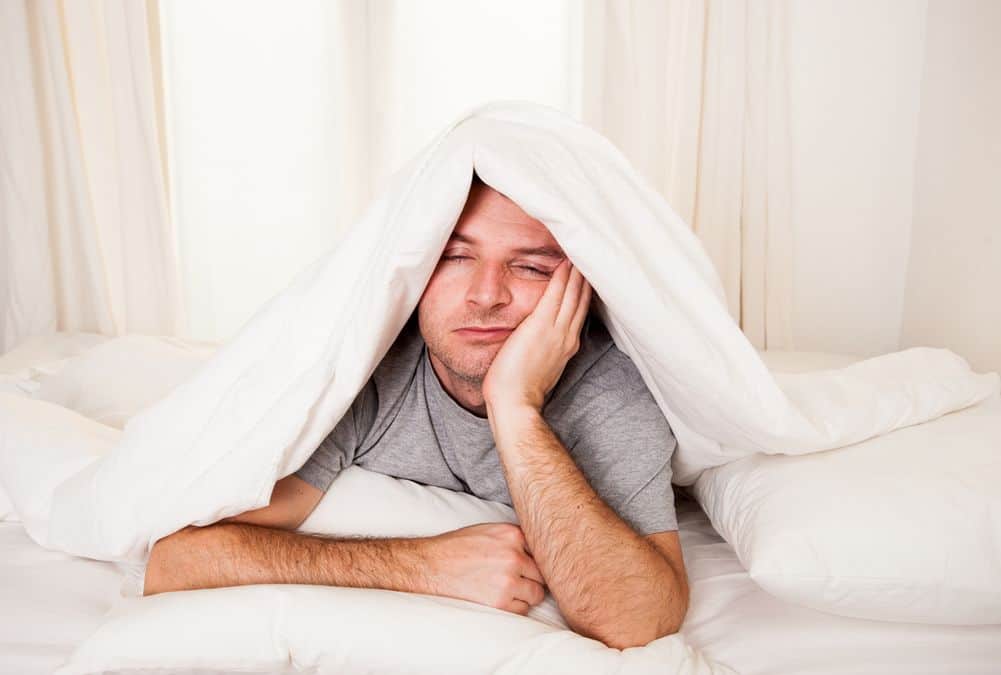
Ways to deal with insomnia – how to cope with it and finally get some sleep
When you lie awake for hours at night, unable to sleep, turning from side to side and not even counting rams helps, and this situation repeats itself notoriously, it may mean that you suffer from insomnia. This is a serious disease, also called insomnia, already included in the civilization, affecting millions of people around the world. Its symptoms do not only mean lack of sleep, but also problems with falling asleep, irregular sleep and waking up too early, all of which require proper treatment. There are many methods of dealing with this troublesome affliction and it is worth using in this fight all available ways for insomnia, to finally get a decent sleep.
Contents
Insomnia – definition of the concept
Many people do not associate insomnia with a medical condition, treating it as a temporary and essentially harmless ailment. However, this is completely wrong reasoning, making us underestimate it, and research clearly shows that sleep problems can affect up to 45% of the adult population. Under the term of insomnia we understand all sleep disorders, primarily such as:
- its quality;
- rhythm;
- depth;
- duration of sleep and waking period;
- premature awakening;
- feeling tired even after several hours of continuous sleep.
Minor or major sleep disorders can happen to anyone, regardless of age, gender or nature of work. We will write about their causes in more detail below, however it is worth knowing that there are certain risk groups which are more susceptible to this disease. Here we mean primarily the elderly, with chronic diseases with a mental or neurological basis. Particularly vulnerable are also women undergoing menopause, being in the middle of a period, pregnant, or postpartum.
Insomnia – the causes of the disease

Determining all the causes of sleep problems usually requires a visit to a specialist, who at the same time will help choose the right treatment, although knowing the reasons why we do not sleep, you can also use home remedies for insomnia, guaranteeing a strong and good sleep. They work surprisingly well, but when the symptoms are very intense, it turns out to be necessary to use strong, psychotropic sleeping drugs assigned by a doctor.
The causes of the disease are many, and there is also a division of them into primary, secondary, organic and inorganic, but the most common ones that we may encounter and try to deal with are:
Mental health problems
Affecting as much as more than 50% of all cases of insomnia, often associated with another civilization disease of our time, namely stress. Nowadays it would be difficult to find a person who has not encountered it at least once, feeling all its symptoms, and one of them is the growing difficulty in falling asleep. Apart from stress, other psychological ailments are also responsible for them:
- neurosis;
- severe anxiety and delusional disorders;
- depression or schizophrenia, illnesses which absolutely require specialist drug treatment;
- states of strong emotional agitation;
- disorders resulting from post-traumatic stress disorder;
- bipolar affective disorder;
- experiencing fear of insomnia itself, particularly intensified if such problems have occurred before.
Coexisting, often unrecognized diseases
Insomnia is not caused exclusively by diseases with a basis lying in our psyche, equally often the cause is somatic disorders, physical ailments responsible for about 30% of diagnosed sleep disorders. These primarily include:
- chronic pain syndrome and practically any recurrent cyclical pain of medium to high intensity;
- physical damage to various parts of the nervous system;
- diseases that slow down the metabolism and make it difficult to fight overweight;
- thyroid diseases, hyperthyroidism, hypothyroidism or chronic inflammation of the thyroid gland, Hashimoto disease affecting women, resulting from, among other things, a weakened immune system;
- hypertension, heart failure, and ischemic heart disease;
- asthma and other respiratory diseases, especially of the lungs;
- gastrointestinal complaints, indigestion, digestive disorders, gastric reflux;
- prostate hypertrophy;
- cancer;
- sleep apnoea manifested by snoring;
- Parkinson’s disease or Alzheimera;
- restless legs syndrome (RLS).
Alcohol, other drugs and medication
One of the most common reasons for rolling over from side to side for hours on end is alcohol abuse, which has a devastating effect on overall health. If we drink immediately before going to bed, we risk disturbing two important phases of sleep:
- the NREM phase responsible for daydreaming deepens;
- the REM phase, responsible for the so-called deep sleep, is distorted, which affects the quality of sleep.
Sleeping this way, you will certainly not get any rest, and on the next day, in addition to hangover symptoms, you will feel constantly tired and lack energy to perform even the simplest activities, and have problems with concentration and nervousness. Similar effects can be observed after drinking nicotine or caffeine in excess, and they are also caused by some medications, such as antidepressants or hormonal contraceptives.
Problems with melatonin secretion
Problems with falling asleep, poor quality of sleep and insomnia itself, are also directly related to melatonin deficiency in our body. This is a hormone produced naturally in the pineal gland, due to its properties called “sleep hormone” and produced only in the dark. Any, even small, fluctuations in its level disturb our biological, daily clock, without which the body does not distinguish between the rhythms of wakefulness and sleep, and the result is, among others, increasing difficulty in falling asleep.
Insomnia – characteristic symptoms
All of the above described causes of sleep disorders, leading to complete insomnia, give very characteristic symptoms, which, although varied, are easy to recognize on their own. Most often we experience such abnormalities as:
- a constant feeling of sleepiness, often accompanying us during the day;
- bad mental mood, irritability and nervousness, which become a source of conflicts at home or at work;
- problems with concentration, memory and concentration on even the simplest activities;
- frequent waking up at night, which also prevents proper rest and regeneration of the body;
- headaches of different intensity and of tension or migraine origin;
- disorders of the digestive system, starting with heartburn, through indigestion, flatulence, up to diarrhea;
- waking up too early and feeling sleepless;
- digestive disorders that may even lead to overweight and obesity.
Natural remedies for insomnia
Sleep is necessary for us to function properly, and we define it as a physiological state of the central nervous system in which our body remains motionless and unconscious for some time. How much sleep we need per day depends on many factors, including age, and the average daily amounts of sleep are as follows:
- infants, 12 – 15 hrs;
- Preschool children, 10 – 13 hours;
- School-age children, 9 – 11 hours;
- teenagers, 8 – 10 hours;
- adults, 7 – 9 hours.
There are many methods of treating sleep disorders, you do not necessarily have to immediately reach for sleep medications, may be effective, but they also carry with them numerous, difficult to trivialize, side effects. That is why it is better to listen to your body, make some changes in lifestyle and use only natural methods for insomnia in teenagers, adults and the elderly.
Generations of people, including our Mums or Grandmothers, who appreciate the achievements of natural medicine, have tested them. If we think and ask ourselves what to do for insomnia, home remedies will prove to be the best solution, and contrary to appearances, the implementation of such changes should not pose many difficulties. The absolute basis here is the proper hygiene of sleep, depending on such factors as:
Changing your diet to a lighter and healthier one
One of the reasons why we cannot sleep is our diet, which is also the cause of many ailments, especially digestive, described above. What we eat is often far from the recommendations of doctors and dieticians, who recommend above all a light diet full of nutrients, without which we can’t dream of sleeping. Nutritionists also pay attention to the time of eating dinner, recommending that it be eaten 2-3 hours before going to bed.
Apart from the time of eating the last meal, what we eat in the evening is equally important and we should give up excess protein in favour of more easily assimilable carbohydrates. You should carefully choose their source, remembering at the same time to have a low glycaemic index, so it is better to avoid white bread from wheat flour, potatoes and fried meat, and it is worth replacing all that:
- dark wholemeal bread, which has a good impact on digestion;
- brown rice;
- wholemeal pasta;
- various groats;
- plenty of fruit and vegetables,
- healthy fats, coconut oil full of Omega – 3 fatty acids.
Herbal infusions

Do not drink in the evening large amounts of stimulating drinks, especially coffee and tea, or even yerba mate, on the other hand, calming herbs such as lemon balm, equally calming chamomile or infusion of mint to help digestion of the dinner.
We especially recommend lemon balm (Melissa officinalis), also known as citrus herb, whose properties predispose it to the well-deserved name of “queen of good sleep”. This is due, among other things, to its composition, in which the most important are essential oils beneficial to our health showing effectiveness in, among others:
- relieving symptoms of stress;
- chronic fatigue syndrome, also disturbing the quality of sleep;
- neuroses, including heart and anxiety and depression;
- migraine headaches;
- other conditions causing sleep problems;
- problems with digestion and slow metabolism.
Similar effects to lemon balm are also characteristic of other herbal preparations, e.g. valerian root extract (Valeriana officinalis), just as often used when we have more and more trouble sleeping. Valerian root, more widely known as simply valerian, is another effective remedy for insomnia recommended by specialists. Its calming properties will make us get up perfectly rested and fully relaxed in the morning after a few hours of heavy sleep.
Very often asked question is how to insomnia in pregnancy, not harming the mother and child. Women in this state, however, should not use valerian, but lemon balm is highly recommended, especially in the first trimester. Then it alleviates all stomach discomforts, while providing minerals necessary for health and large doses of vitamin C.
Physical activity
The reason for insomnia, often ignored by people suffering from it, is a not very active, sedentary lifestyle. We can safely risk a statement that the one who spends all day at work at a desk, and after returning home on the couch in front of the TV, certainly does not get a decent sleep. Of course, we are not talking about a huge effort just before going to bed, because it will have the opposite effect and you will not fall asleep.
It’s better to get tired during the day, and in the evening gradually calming perfectly oxygenated body, so that sleep will certainly be long and deep. In the evening, go for a relaxing walk, ride a bike for an hour, do some gymnastics or choose another form of physical activity which is equally calm.
Comfortable bed, mattress and well ventilated bedroom
Everyone knows the old and very true proverb “as you make your bed, so you sleep”. In order to have a good rest at night, you need to have a comfortable bed and, first of all, a properly chosen, comfortable mattress. It can be neither too soft nor too hard, it should naturally adjust to the curvature of the body, returning to its original form in the morning, without permanent deformations, at the same time ensuring good ventilation. Let’s also remember about the bedding, necessarily made of natural, breathable and not artificial materials.
Just as important as the bed, mattress and bedding, is the ventilation of the bedroom, the last time half an hour before bedtime. It will allow for an effective exchange of air, and the time that will pass before we go to bed will allow for warming of bedclothes, because nobody likes to go to a cold bed, especially in winter. Before going to sleep, read your favourite relaxing book for a while, but only in a traditional paper edition. Remember also that reading on a glowing screen of a smartphone, tablet or laptop can cause disturbances in melatonin secretion, interfering with the process of falling asleep.
Dietary supplements – Melatonin Plus
If you’re looking for accurate information on what are proven home remedies for insomnia, the insomnia forum will be a good source. There we will find “first-hand” news, users’ opinions on how they themselves cope with this disease, and even information about dietary supplements that can help in its treatment.

Specialists recommend one in particular, Melatonin Plus with research-proven efficacy directly resulting from the appropriate selection of natural active ingredients, which are:
- melatonin;
- lemon balm;
- hop cones containing lupulin, an ingredient with sedative and sleeping effects;
- chamomile, a source of essential oils that help us sleep through the night;
- Indian ginseng root, relieving symptoms and effects of stress, allowing to maintain calmness even in the most nervous situations;
- tryptophan, which conditions the correct production of melatonin in the pineal gland;
- l – theanine, which facilitates falling asleep;
- GABA, or gamma – aminobutyric acid, a neurotransmitter whose deficiency is another cause of sleep problems;
- Vitamin B6 (pyridoxine), which improves nervous system function;
- saffron, which is relaxing and helps maintain a good mood and mental balance regardless of the situation we find ourselves in.
Melatolin Plus is a supplement that works comprehensively, tackles most causes of insomnia, is completely safe to use and can be taken without the risk of side effects. At the best price, you can buy it through the manufacturer’s website and finally get a good night’s sleep.

Sources:
- https://www.healthline.com/health/insomnia
- https://www.healthline.com/nutrition/melatonin-and-sleep
- https://www.healthline.com/health/lemon-balm-uses



